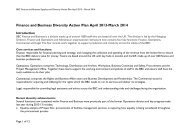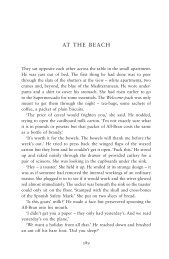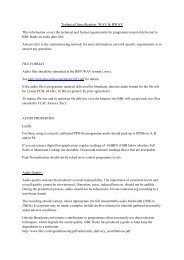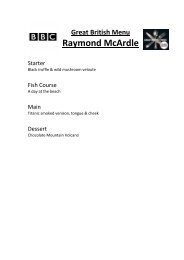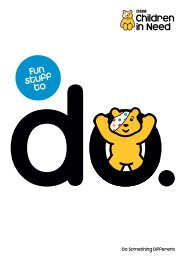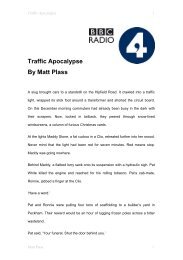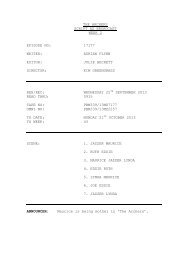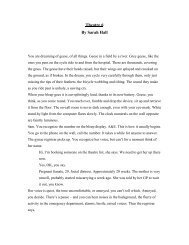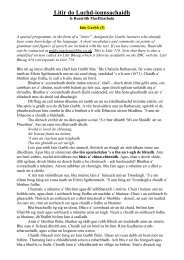What is internet security? - BBC.com
What is internet security? - BBC.com
What is internet security? - BBC.com
Create successful ePaper yourself
Turn your PDF publications into a flip-book with our unique Google optimized e-Paper software.
<strong>What</strong> <strong>is</strong> <strong>internet</strong> <strong>security</strong>?<br />
bbc.co.uk/webw<strong>is</strong>e<br />
The online world <strong>is</strong> an amazing place but, like the real world, there are some r<strong>is</strong>ks.<br />
However, don’t let those r<strong>is</strong>ks put you off exploring the <strong>internet</strong>. All you need to do <strong>is</strong><br />
take a few precautions…<br />
Avoid viruses<br />
First of all, keep your <strong>com</strong>puter healthy. Help it avoid viruses. You’ll see them given<br />
many different names, such as ‘malware’ and ‘spyware’. But viruses are basically all<br />
programs or files with one thing in <strong>com</strong>mon - they’re out to cause trouble by gaining<br />
access to your device and attacking personal data.<br />
Your <strong>com</strong>puter’s built-in ‘firewall’ will keep some of them out, so make sure it’s<br />
turned on. And you should install anti-virus software which – if you keep it up to date<br />
– will usually block most other threats.<br />
You can buy anti-virus software from a <strong>com</strong>puter shop or download it online<br />
(sometimes for free). Once installed, the software will protect against new viruses<br />
with regular updates. These updates may occur automatically or you’ll be prompted<br />
to install them.<br />
You can find out more about firewalls and anti-virus software by taking a look at the<br />
relevant sites l<strong>is</strong>ted in the Related Links section at the end of th<strong>is</strong> guide.<br />
Use strong passwords<br />
Don’t make it easy for someone to pretend to be you online. Services like <strong>internet</strong><br />
banking or email will often ask you for a password to stop strangers from accessing<br />
your private information.<br />
Never pick obvious passwords like your user name, real name, date of birth, names<br />
of family members or simple sequences like ‘abcdef’ or ‘123456’.<br />
Criminals are be<strong>com</strong>ing more and more skilled at hacking into accounts by guessing<br />
weak passwords. For example, a <strong>com</strong>monplace word (which you would find in a<br />
dictionary) could be cracked by hacking programs.<br />
Remember to use different passwords for different websites and to change your<br />
passwords regularly.<br />
<strong>BBC</strong> © 2013<br />
The <strong>BBC</strong> <strong>is</strong> not responsible for the content on external websites
c.co.uk/webw<strong>is</strong>e<br />
<strong>What</strong> <strong>is</strong> <strong>internet</strong> <strong>security</strong>? (continued)<br />
Be smart and <strong>com</strong>e up with strong passwords – ones that are a <strong>com</strong>bination of<br />
letters (upper and lower case), numbers and symbols. But don’t make them so<br />
<strong>com</strong>plicated that you can’t remember them!<br />
Don’t reveal too much<br />
Also, be cautious about revealing personal and private details or your email address<br />
when you’re online. Th<strong>is</strong> <strong>is</strong> especially important when you’re using social networking<br />
sites. Make sure you’re happy with your privacy settings.<br />
Your identity and personal information are valuable to criminals. If they get hold of<br />
details such as your full name, address, date of birth, phone number, as well as<br />
credit card details or bank account numbers, there’s a r<strong>is</strong>k that they might steal your<br />
identity. Th<strong>is</strong> means that they could apply for products or services in your name.<br />
Check for secure sites<br />
Of course, sometimes you may need to enter personal details on a website. So get<br />
used to checking that the site <strong>is</strong> secure.<br />
Look out for a small padlock symbol in the address bar (or elsewhere in your<br />
browser window) and a web address beginning with https:// (the s stands for<br />
‘secure’).<br />
And, if you want to download a product, a picture or a file, make sure it’s from a<br />
website that you trust - for example, a reputable <strong>com</strong>pany site, a site that you have<br />
used safely in the past, or a site that a trustworthy friend or family member has<br />
re<strong>com</strong>mended to you.<br />
Consider your location<br />
Finally, think about where you are. Be aware of who <strong>is</strong> around you and what they<br />
might be able to see over your shoulder. If you’re not using your own <strong>com</strong>puter, don’t<br />
leave behind any details or open pages when you’ve fin<strong>is</strong>hed.<br />
Also, when you’re using a wireless <strong>internet</strong> service (also known as ‘Wi-Fi’) on any<br />
<strong>com</strong>puter in a public place, you cannot guarantee that the network <strong>is</strong> secure. Th<strong>is</strong><br />
applies even if you have been given a password to use. If you can avoid it, it’s best<br />
not to send or receive private information when using a public wireless network.<br />
<strong>BBC</strong> © 2013<br />
The <strong>BBC</strong> <strong>is</strong> not responsible for the content on external websites
c.co.uk/webw<strong>is</strong>e<br />
<strong>What</strong> <strong>is</strong> <strong>internet</strong> <strong>security</strong>? (continued)<br />
There’s so much to d<strong>is</strong>cover and enjoy in the online world. By taking a few simple<br />
precautions, you can feel safer while you’re exploring the web.<br />
<strong>BBC</strong> Links<br />
<strong>BBC</strong> WebW<strong>is</strong>e: Basic online skills – l<strong>is</strong>t of guides<br />
http://www.bbc.co.uk/webw<strong>is</strong>e/0/20595791<br />
<strong>BBC</strong> WebW<strong>is</strong>e: Course – Keeping safe online<br />
http://www.bbc.co.uk/webw<strong>is</strong>e/accredited-courses/level-one/keeping-safe-online<br />
<strong>BBC</strong> Consumer: How to prevent identity theft<br />
http://www.bbc.co.uk/consumer/22342924<br />
Related Links<br />
Get Safe Online: Maintaining your privacy<br />
https://www.getsafeonline.org/protecting-yourself/privacy/<br />
Get Safe Online: Importance of having strong passwords<br />
https://www.getsafeonline.org/protecting-yourself/passwords/<br />
Get Safe Online: Using <strong>com</strong>puters, tablets and smartphones in public<br />
https://www.getsafeonline.org/protecting-yourself/using-public-<strong>com</strong>puters/<br />
Digital Unite: Internet <strong>security</strong> (simple rules for staying safe online)<br />
http://digitalunite.<strong>com</strong>/guides/<strong>internet</strong>-<strong>security</strong><br />
Digital Unite: All about firewalls and anti-virus software<br />
http://digitalunite.<strong>com</strong>/guides/<strong>internet</strong>-<strong>security</strong>/anti-virus<br />
<strong>BBC</strong> © 2013<br />
The <strong>BBC</strong> <strong>is</strong> not responsible for the content on external websites




